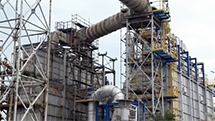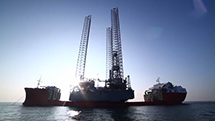Glossary of industry terms
-
A
ACEA
European Automobile Manufacturers’ Association; it establishes quality criteria for engine oils, applicable across Europe. ACEA European Oil Sequences 2008 are the published quality criteria for all engine oils on the European market, including the requirements to be met by engine oils for new cars. The document categorises oils and specifies all physical and chemical parameters, as well as engine tests for each quality category. ACEA requires that any claims for oil performance to meet the ACEA standards must be based on credible data and controlled tests in accredited test laboratories.
APC
(Advanced Process Control) is a computerized manufacturing process control system in place in the Gdańsk Refinery since 2001. APC simultaneously controls a large number of technological process parameters at the industrial plant. With the help of this system, one can optimize the plant operations, increasing the yield of the desired products and keep the plant working safely.
ARA
the market with its territory delineated by the ports of Antwerp – Rotterdam – Amsterdam.
Atmospheric distillation
a physicochemical process used to separate component products of a mixture, using differences in the boiling point temperatures of individual components. In the process of atmospheric distillation, individual fractions of gases, benzene, paraffin and diesel oils become separated. Heavier hydrocarbons constitute so-called atmospheric remnants. Atmospheric distillation is a process carried out at a pressure close to atmospheric pressure.
Audit recertifying the Integrated Management System (renewal)
an audit aimed at assessing the compliance of the management system with the requirements of the standards. A recertifying audit is carried out in the period determined by the certifying entity to extend the validity or issue a new IMS certificate.
-
B
B3 Oil Field
a marine natural gas and oil field located about 73 km north of Rozewie. In operation since 1992, it hosts the Marine Oil Mine (Morska Kopalnia Ropy). It is the main source of crude oil produced by LOTOS Petrobaltic.
B8 Oil Field
a marine natural gas and oil field located about 68 km northeast of Rozewie.
B100
B100 (fuels) - a determination of fuels produced solely from a biocomponent.
Barrel
(of crude oil) - a primary unit of measure used in crude oil production. One barrel encompasses around 159 litres.
Base oil
unrefined oil, without improvers, obtained in the processing of crude oil. It represents the base raw material in the manufacture of lubricant oils.
BAT
Best Available Technique is, within the meaning of the definition contained in Directive 96/61/EC, the most effective and advanced stage in the development of activities and their methods of operation which indicate the practical suitability of particular techniques for providing in principle the basis for emission limit values designed to prevent, and where that is not practicable, generally to reduce emissions and their impact on the environment as a whole.
Biocomponent
an additive used in fuel production made in biomass processing of e.g. oil plants or corn.
Biofuel
fuel manufactured by adding more than 7% biocomponents to gasoline or diesel oil.
BREF
(BAT Reference Notes) - BAT guidelines developed by the European IPPC (Integrated Pollution Prevention and Control) Bureau in Seville, Spain. They are not binding legal regulations, but guidelines to be followed in the assessment of applications for integrated permits and issuance of integrated permits.
-
C
CD Process
(Continuous Deglycerolization Process) - a manufacturing process of fatty acid methyl esters used at the installation located in Czechowice-Dziedzice.
CDU/VDU
(installation) - a basic installation system used for crude oil processing comprising a Crude Distillation Unit (CDU) and Vacuum Distillation Unit (VDU).
Ceresin
product of deoiling of heavy slack waxes. Ceresin is a complex mixture of n-paraffin hydrocarbons with a solidification point of approximately 73°C. It may be used as feedstock in the production of lubricants, proofing and protective products in the chemical industry and, after a purifying process, in the cosmetics and pharmaceutical industries.
CLP Regulation
Classification, Labelling and Packaging Regulation - regulation under which a new system for the classification, labelling and packaging of substances and mixtures has been implemented in the European Union, based on the Globally Harmonised System of Classification and Labelling of Chemicals created by the United Nations in 2003. The CLP Regulation supplements the REACH Regulation and replaces the system provided for in Directives 67/548/EEC and 1999/45/EC. The Regulation took effect on January 20th 2009 and is binding directly, without the need to be implemented into Polish law.
CODO stations
(company-owned, dealer-operated) - stations owned by LOTOS Paliwa and managed by external companies.
Component for bitumen production
usually a heavy vacuum distillate fraction obtained from crude oil, which can be further processed on the installation for bitumen manufacture.
Confirmed resources
the volume of oil production that may be estimated based on geological analyses and engineering data with reasonable certainty as commercially available for production since a specific date, from the known deposit horizons and in specific economic conditions, using the defined operational methods and based on determined administrative regulations.
Conversion
conversion processes usually involve technological cracking processes. In such processes, components with high boiling temperatures (heavy distillates) are used to manufacture light products used for fuel production. The most common conversion processes are thermal cracking, catalytic cracking and hydrocracking.
Crude oil
naturally occurring liquid, recovered from beneath Earth’s surface. I consists mainly of hydrocarbons with various molecular weights and various chemical structure with minor quantities of organic compounds of nitrogen, oxygen, sulphur and some other elements. Crude oil is a main feedstock for oil refineries and is processed towards fuels and other hydrocarbon based products.
-
D
DAO
(De-Asphalted Oil) - oil produced with an SDA installation used as a raw material for further refining. It may be the basis for producing base oils or an input for a cracking process.
DODO stations
(dealer-owned, dealer-operated) - stations operating under the logo of the Gdańsk Refinery under patronage contracts.
DOFO stations
(dealer-owned, franchise-operated) - stations operating under the LOTOS brand within trading partnership under long-term franchise agreements.
-
E
ETBE
(Ethyl Tert-Butyl Ether) - the name of a high-octane biocomponent used in gasoline production. It is manufactured in petrochemical complexes with ethanol and isobutylene.
Ethanol
ethyl alcohol used e.g. as a biocomponent for producing fuels and biofuels used in cars with ignition engines.
European Chemical Agency
the EC agency responsible for the implementation of the REACH (Registration, Evaluation and Authorisation of Chemicals) Regulation as regards the establishment and administration of a registration system, assessment of, issuance of authorisations for, and imposition of restrictions in the use of, chemical substances at the EU level. Its main task is to manage the database of chemicals submitted for registration: initial registration of a substance (the process already completed) and proper registration of a substance. Under the European Council’s decision of 2004, the registered office of the European Chemicals Agency (ECHA) is located in Helsinki, Finland.
-
F
FAME
(Fatty Acid Methyl Ester) - such esters are biocomponents used to manufacture fuels and biofuels for diesel engine vehicles. FAME is manufactured by the transesterification of oil with methanol in the presence of a catalyst.
Forties Blend
a type of crude oil from the North Sea. Forties Blend is light petroleum with a low content of sulphur and a high potential in gasoline production.
Furfurol extraction
a technology applied to increase the quality of base mineral oils. During the process unfavourable aromatic hydrocarbons are separated, which increases the so-called viscosity index.
-
G
Gasoline isomerisation
a refining process that creates a higher octane number of the gasoline fraction by changing the chemical structure of particles.
Gasoline natural gas
natural gas that contains, apart from methane and ethane, a certain quantity of heavier hydrocarbons.
Gasoline reforming
a refining process that involves a reaction with a catalyst creating high-octane aromatic hydrocarbons and hydrogen.
General nitrogen
the content of nitrogen for nitrogen bound in all possible chemical forms.
-
H
HDS
(Hydrodesuplhurisation Diesel Unit) - a system for the hydrodesulphurization of diesel oils.
Heavy fuel oil
an oily liquid representing a residue from the distillation of crude oil. Heavy fuel oil finds its use in industrial installations of large manufacturing or processing facilities, as well as in combined power plants. It is also used as bunker fuel for ships.
HGU
(Hydrogen Generation Unit) - a system for hydrogen production.
Hydrocracking
a refining process used to produce high quality fuel components during the reaction of vacuum distillates with hydrogen with a catalyst. Hydrocracking processes usually take place at a very high pressure and provide components that are free of sulphur and contaminations.
Hydrorefining (of slack wax)
a process of purifying paraffin during the reaction with hydrogen in a catalyst.
-
I
ISO
International Organization for Standardization.
-
J
Jet A1
aviation fuel for jet and turbine engines.
-
K
KAS
(installation) - an amine-sulphur complex of installations for purifying refining gases of hydrogen sulphide and for the production of liquid sulphur.
-
L
LCA
(Life Cycle Assessment) - the assessment of a product life aimed at determining the environmental impact (emission of greenhouse gases during individual stages of production, processing and transport). LCA also determines the environmental impact resulting from obtaining biomass, transport and its processing into biofuels vs. the impacts that occur in the life cycle of fossil fuels.
Light fuel oil
a product obtained in crude oil processing characterized by a lower sulphur content and density than heavy heating oil. The light fuel oil is mainly used in household boiler rooms, in SMEs and institutions. It is also successfully used as the heating fuel in the boiler rooms of residential estates.
LPG
(Liquefied Petroleum Gas) - a liquefied gas, being a mixture of propane and butane, obtained in the processing of crude oil. Among its other applications, LPG is used as engine fuel or as fuel for household gas stoves.
LPG amine washing installation
a system for removing hydrogen sulphide from the liquid gas fractions.
Lubricant oils
a composition of base oil and improvers. The quantity, type and relative proportions of these components are decisive for the class of the oil manufactured. Their main task is to reduce friction between the surfaces of the movable parts of mechanical devices that touch each other and work together. Lubricant oils are used in the automotive industry and for industrial applications.
-
M
Mechanical Completion (MC)
completing building-assembly work by signing a protocol between the ordering party and the contractor, which confirms that all work has been completed in compliance with the design and applicable regulations.
MHC
(Mild Hydrocracking) - a hydrocracking installation that operates in slightly milder conditions than a standard hydrocracking system.
Modified asphalts
asphalts characterized by improved quality parameters, thanks to the interaction between asphalt and an applied modifier.
MTBE
(Methyl Tert-Butyl Ether) - a high-octane component used for gasoline production. Unlike ETBE, it is not a biocomponent.
-
N
Naphtha
a fluid fraction of crude oil composed of hydrocarbons whose particles contain 9-16 atoms of carbon. Naphtha can be processed into aviation fuel and diesel oils.
National Index Target
a minimum share of biocomponents in the total volume of liquid fuels and liquid biofuels used during a calendar year in transport, calculated according to the caloric value.
-
O
Oil transesterification
a chemical reaction resulting in the formation of fatty acid methyl esters. The transesterification reaction of oils is a reaction of oil with methanol in the presence of a catalyst.
-
P
Paraffin
a mixture of solid saturated hydrocarbons, separated from the fractions of crude oil. It is used, among others, to manufacture candles, as a floor polish and as an insulation material.
Paraffin fraction
unreacted oil from hydrocracking of a mixture of vacuum distillates and oil from the solvent de-asphalting process of heavy residue. Paraffin fraction is a mixture of n-paraffin, iso-paraffin and cyclic saturated hydrocarbons. It has a low sulphur content (below 100 mg/kg) and may be used as feedstock in the production of oil bases, or in catalytic cracking or hydrocracking yielding additional volumes of fuels.
Plasticizers
plasticizing improvers added to polymer products. Grupa LOTOS manufactures hydrocarbon plasticizers for the rubber industry.
Ppm
(parts per million) - a popular measuring method used to express the concentration of extremely diluted solutions of chemical compounds. This measure tells how many particles of a chemical compound are to be found among one million particles of the solution.
-
R
REACH
Regulation of the European Parliament and Council concerning the safe application of chemicals through their registration and assessment and in some cases granting commercial permits and restrictions as regards the application. It came into force on 1 June 2007 and replaces several dozen previous community legal acts, both regulations and directives introduced into Polish legislation with the Act of 11 January 2001 on chemical substances and preparations.
Ready For Start Up (RFSU)
the condition of readiness for start-up achieved by the system (introduction of production media).
REBCO
(Russian Export Blend Crude Oil) - a commercial name of Russian crude oil from the Ural.
Red chemicals
are those which have pollution category Y and are on the list of chapter 17 of the IBC Code or on MEPC.2/Circ. currrently in force.These chemicals deemed to present a hazard to marine resources or human health or cause harm to amenities or legitimate uses of the sea.
Reformate
high-octane number component, with octane number of 96–100, used in the manufacture of engine gasolines. Reformate is a product of catalytic reforming of desulphurised naphta.
ROSE
(Residual Oil Supercritical Extraction) - a technology used at the Gdańsk Refinery in the SDA installation.
-
S
SDA
(Solvent Deasphalting) - an installation used to separate vacuum remnants after crude oil processing into lighter fractions, i.e. deasphalted oil (DAO) and heavier fractions, namely a bitumen component.
Shale gas
refers to natural gas that is trapped within shale formations. Shales are fine-grained sedimentary rocks that can be rich resources of petroleum and natural gas. Sedimentary rocks are rocks formed by the accumulation of sediments at the Earth's surface and within bodies of water. Common sedimentary rocks include sandstone, limestone, and shale.
Slack wax
a semi-product received in crude oil processing. It is used to produce wax.
Stakeholder
A person or entity interested in the operation of a firm and incurring various types of risks related to its business or the persons or entities that are affected by a firm through its activities. Unlike shareholders, who are primarily interested in the profits of the company, stakeholders include a much wider group, e.g. employees, customers, creditors, suppliers, government administration and, in a wider context, local communities, the natural environment and public opinion. The term was first introduced by the Stanford Research Institute in 1963.
Stock ticket service
service consisting in the creation and maintenance of mandatory reserves of fuels on behalf of customers. A customer using the service meets the legal requirements without stocking its own fuels.
-
T
Troll Blend
a type of crude oil from the North Sea. The Troll Blend is an average crude oil with a low sulphur content and a high potential within the production of diesel oils.
-
V
Vacuum distillate
a fraction of hydrocarbons separated from a more complex mixture with distillation under a reduced atmospheric pressure. Vacuum distillates produced from crude oil are usually used to produce base oil, and also as input for cracking processes.
Vacuum distillation
a process analogical to the process of atmospheric distillation, conducted, however, at a reduced ambient pressure. It uses a physical property, whereby the boiling point decreases as the ambient pressure is reduced. It makes it possible to separate vacuum distillates in the atmospheric residuals. Heavy remnants of the distillation process are so-called vacuum residuals.





















 E-mail
E-mail Facebook
Facebook Google+
Google+ Twitter
Twitter